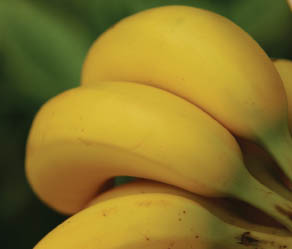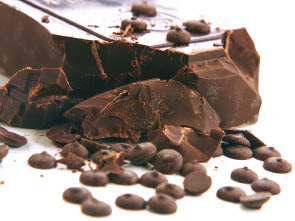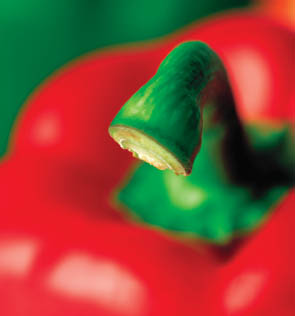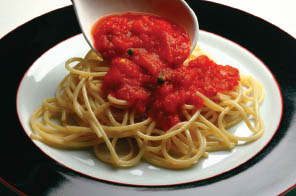Good sources of carbohydrate, such as pasta, are an intrinsic part of the successful runner’s diet.
Don’t limit your diet. Eat as many healthy foods as possible, starting with the ones listed in this chapter.
You might think a list of best foods for runners would include only a handful of items. Perhaps just the foods you could find in a health food store. Or maybe the kinds of foods you would see on the finish-line tables after a local road race: bananas, bagels, sports drinks, and other standard high-carbohydrate fare.
Well, those do work well. But runners don’t have to limit their foods to just a few. Many others also provide the energy you want for running along with the vitamins, minerals, and micronutrients you need for optimal health. Some of these foods are surprising ones, too. Like chocolate. And clams. And steak. And red bell peppers. Yes, you need plenty of carbohydrate to fuel your workouts. But as a runner, you also need higher amounts of certain vitamins and minerals—especially antioxidants—than your sedentary peers. You need more protein, too. And you can find these important nutrients in some of the most surprising places.
The following foods will give you all the nutrients you need to run faster, recover quicker, and feel more energized all day long. Most are low fat, so they’re good for your waistline, too. What’s more, it’s a certainty that there’ll be at least several kinds of food you love. Whether it’s almonds you adore, salmon you salivate over, or pasta you pine for, the best foods for runners are also some of the tastiest.
Many studies show that these tasty treats will reduce your risk of heart disease and cancer. Since they’re easy to prepare, you’ll have plenty of time for your workouts as well as healthful meals.
1. LOW-FAT (1%) MILK
Serving: 8 ounces
Carbohydrate: 11.7 grams
Protein: 8 grams
Fat: 2.6 grams
Calories: 102
Benefits: Drinking low-fat (1%) milk or fat-free milk is the easiest way to get high amounts of calcium into your body. Calcium is one of the more important nutrients for runners, because it’s involved in crucial bodily functions such as bone-mineral formation, muscle contraction, and nerve conduction, says number-one calcium fan Ellen Coleman, R.D., author of Eating for Endurance. Consuming adequate calcium helps prevent stress fractures, shin splints, and possibly muscle cramps. Lastly, milk is a great postrun recovery food because it provides both carbohydrate and protein. (Avoid milk just before running, however, because it can cause side stitches.)
Serving suggestions: Drink it straight, make a fruit milk shake, or pour it over your favorite high-fiber cereal. If you’re lactose intolerant, use reduced-lactose milk or milk with live cultures.
2. CANOLA OIL
Serving: 1 tablespoon
Carbohydrate: 0 grams
Protein: 0 grams
Fat: 11 grams
Calories: 99
Benefits: For optimal performance, runners need to obtain about 30 percent of their calories from fat. And of all the different sources of fat out there, canola oil is the best, says Runner’s World magazine nutrition columnist Liz Applegate, Ph.D. Compared to other oils, canola has the lowest level of artery-clogging saturated fat and one of the highest levels of monounsaturated fat, which lowers your risk of heart disease. Canola is also rich in omega-3 fatty acids, which are found in fish and are known to fight heart disease.
Serving suggestion: Use canola oil instead of other fats, such as butter and margarine, when cooking or baking.
3. BAGELS
Serving: 1 plain bagel
Carbohydrate: 37.6 grams
Protein: 7.5 grams
Fat: 1.5 grams
Calories: 197
Benefit: This easy-to-eat snack comes packed with muscle-fueling carbohydrate. Truly one of the old standbys before or after a run.
Serving suggestion: If you have a bagel before running, eat it either plain or with jelly to avoid adding fat such as cream cheese, which slows digestion.
4. BANANAS
Serving: 1 medium banana
Carbohydrate: 26.7 grams
Protein: 1.2 grams
Fat: 0.5 gram
Calories: 105
Benefits: Chock-full of carbohydrate and easy to digest, bananas are another classic. They come with a nice dose of potassium, an important mineral that helps keep blood pressure low. Bananas also supply plenty of vitamin B6, which helps fuel your running.
Serving suggestions: Eat alone or combine with peanut butter.

Eat bananas for energy and to fend off those sugar cravings.
Serving: 3 ounces
Carbohydrate: 0 grams
Protein: 22 grams
Fat: 3.8 grams
Calories: 127
Benefits: Salmon and other types of fatty fish come packed with omega-3 fatty acids, important oils that keep your immune system strong. Scientists say that these types of fish can prevent stroke, heart attacks, asthma, dementia, prostate cancer, and premature births. They also may boost blood flow, which could improve your running.
Serving suggestion: Grill salmon and top it with a fruit salsa of sliced kiwi, papaya, cilantro, and a jalapeño pepper. The salsa provides important antioxidants as well as fiber, says Applegate.
6. FIG BARS
Serving: 2 small fig bars
Carbohydrate: 20 grams
Protein: 1 gram
Fat: 2.5 grams
Calories: 110
Benefits: These mini “energy bars” are great high-carbohydrate snacks that satisfy your sweet tooth without packing fat into your arteries.
Serving suggestion: Eat ‘em right out of the package.
7. ALMONDS
Serving: 1 ounce (about 24 almonds)
Carbohydrate: 5.5 grams
Protein: 5.9 grams
Fat: 14.4 grams
Calories: 172
Benefits: Because almonds are loaded with the antioxidant vitamin E, they may help reduce muscle damage as well as fend off age-related diseases. Almonds also come with a healthy dose of important minerals such as magnesium, iron, calcium, and potassium. Almonds do contain a hefty amount of fat, but it’s mostly the heart-healthy monounsaturated type.
Serving suggestions: Make a trail mix of almonds, cereals, and assorted dried fruits and seeds. Or lightly toast almonds in a nonstick pan and eat them plain.

Fill up on heart-healthy almonds when a snack attack hits you.
8. BREAKFAST CEREAL
Serving: ½ cup
Carbohydrate: 23 grams*
Protein: 3.9 grams*
Fat: 1.1 grams*
Calories: 81*
*Amounts vary by type of cereal
Benefits: Packed with carbohydrate and fortified with vitamins and minerals, a bowl of cereal is a lot like a multivitamin, but with a lot more fiber. Best of all, cereal takes less than a minute to prepare and only a little longer to clean up.
Serving suggestions: Eat with low-fat milk or mix with low-fat yogurt and fruit.
9. GINGERROOT
Serving: 1 teaspoon
Carbohydrate: 1.4 grams
Protein: 0.2 gram
Fat: 0.1 gram
Calories: 7
Benefits: Besides settling your stomach, this spice may act as a natural anti-inflammatory, reducing joint and muscle pain. It also may prevent heart attacks by thinning your blood.
Serving suggestion: Look for dense roots. Grate the root for stir-fry dishes, cold salads, and smoothies.
Serving: 1 medium kiwi
Carbohydrate: 11.3 grams
Protein: 0.8 gram
Fat: 0.3 gram
Calories: 46
Benefits: This tart and tasty fruit is an excellent source of vitamin C. It’s also high in potassium, which can help keep blood pressure low. A juicy kiwi makes a perfect postrun snack on a hot day.
Serving suggestions: Simply peel a kiwi after your run and eat it plain. Or mix it into fruit salads or your favorite smoothies.
11. CHOCOLATE
Serving: 1 ounce
Carbohydrate: 17 grams
Protein: 2 grams
Fat: 9 grams
Calories: 160
Benefits: You have to splurge every once in a while to keep your diet from getting boring, says Applegate, a certified chocoholic. Chocolate tastes great, and unlike many other sweet treats, it contains the same phytochemicals found in red wine, known to fight heart disease. In fact, when researchers recently studied the antioxidant capacity of various foods, chocolate beat out other powerhouses like strawberries and tea.
Serving suggestion: Stick with dark chocolate, since it contains more phytochemicals than milk chocolate. (White chocolate doesn’t contain any.)

Fight cancer with the phytochemicals found in chocolate.
12. BROWN RICE
Serving: 1 cup
Carbohydrate: 45 grams
Protein: 5 grams
Fat: 1.8 grams
Calories: 216
Benefits: All types of rice pack a powerful carbohydrate punch, but brown rice does more, because it provides a wealth of antioxidants. These will help in the battle against heart disease and even muscle soreness.
Serving suggestions: One problem with brown rice is that it takes 45 minutes or more to prepare. So cook up a bunch and freeze it. That way, you only need to add 2 tablespoons of liquid per cup, thaw, and cook it in the microwave. Or buy instant, though this has slightly less fiber and nutrients than regular brown rice.
13. OATMEAL
Serving: ½ cup
Carbohydrate: 27.3 grams
Protein: 5.5 grams
Fat: 3 grams
Calories: 150
Benefits: Oatmeal ranks as one of the best breakfast foods for those watching their weight because, as the saying goes, it sticks to your ribs. Oatmeal’s high amount of water-soluble fiber does more than keep you full: It also lowers your blood cholesterol. High in muscle-fueling carbohydrate, oatmeal is also a good source of iron.
Serving suggestions: Oatmeal is perfect before a long run, as it provides slow-release carbohydrates to your bloodstream. Make it more nutritious by adding dried or fresh fruit.
14. BROCCOLI
Serving: ½ cup
Carbohydrate: 2.3 grams
Protein: 1.3 grams
Fat: 0.2 gram
Calories: 22
Benefits: Broccoli has it all. It’s a great source of vitamin C, which may reduce exercise-induced muscle damage. It’s also a good source of folate and the bone-builders calcium and vitamin K. Broccoli also comes packed with cancer-fighting phytochemicals.
Serving suggestions: Steam broccoli and squeeze some lemon over it. Or chop it up and add it to your favorite pasta dish.
Serving: 3 ounces, chopped
Carbohydrate: 4.4 grams
Protein: 21.7 grams
Fat: 1.7 grams
Calories: 126
Benefits: An excellent low-fat protein source, each 3-ounce serving of clams contains a whopping 24 milligrams of iron, enough to last you for 2 days. Clams also supply a healthy amount of zinc, an immunity-boosting mineral that’s notoriously low in many runners’ diets. Be sure you’re consuming the 15 milligrams of zinc you need each day.
Serving suggestion: Drain and rinse canned clams, which actually have less fat and cholesterol than the steamed version. Add them to spaghetti sauce, suggests clam connoisseur Scott Fisher, R.D., a sports nutritionist in Armonk, New York.
16. RED BELL PEPPERS
Serving: ½ cup, chopped
Carbohydrate: 3.2 grams
Protein: 0.4 gram
Fat: 0.1 gram
Calories: 14
Benefits: These crunchy, colorful vegetables supply more immunity-boosting vitamin C than oranges. They’re also loaded with carotenes, a family of plant pigments known to fight heart disease and cancer.
Serving suggestions: Use them as a colorful addition to any pasta dish or salad. Or cut them up and take them to work.

Red bell peppers provide more vitamin C than oranges.
17. ORANGES
Serving: 1 orange
Carbohydrate: 15.2 grams
Protein: 1.3 grams
Fat: 0.1 gram
Calories: 60
Benefits: An excellent source of carbohydrate, oranges are packed with vitamin C. This powerful antioxidant may help your muscles recover faster after exercise and will keep your immune system running strong, says Coleman. Oranges are also a great source of folate, which helps maintain optimal levels of hemoglobin for your oxygen-carrying red blood cells. The white pith on oranges is loaded with flavonoids that keep LDL cholesterol from turning into plaque.
Serving suggestion: Get in the habit of gulping down a large glass of orange juice after a run. You’ll be:
(1) Replenishing your muscles with carbohydrate.
(2) Boosting your immune system with vitamin C.
(3) Rehydrating your body with fluid.
18. FLAX
Serving: 1 tablespoon
Carbohydrate: 4.1 grams
Protein: 2.3 grams
Fat: 4 grams
Calories: 59
Benefits: Sold as seeds, oil, or a ground meal, flax contains high amounts of alpha-linolenic acid, a type of fat that can boost immunity, blood flow, and possibly even endurance. Flax also keeps your platelets (flat cells in your blood) from clumping together and forming dangerous clots.
Serving suggestions: Use ground flaxseeds when baking muffins, buy breakfast cereals that contain flax (check the label), or mix flaxseed oil into your salad dressings. Store flaxseeds in your refrigerator to keep them from turning rancid.
Serving: 1 cup
Carbohydrate: 40.8 grams
Protein: 15.2 grams
Fat: 0.9 gram
Calories: 227
Benefits: If you’re a vegetarian, black beans, lentils, chickpeas, and other beans are your best source of protein, iron, and soluble fiber. High in carbohydrate, beans are also loaded with folate (folic acid), which may prevent birth defects during pregnancy and fight heart disease.
Serving suggestions: Buy canned black beans, chickpeas, kidney beans, or any other beans. Throw them in a blender with some spices to make tasty sandwich spreads or add them to soups and salads.
20. RAISINS
Serving: 2/3 cup
Carbohydrate: 79 grams
Protein: 3.4 grams
Fat: 0.5 gram
Calories: 302
Benefits: High in carbohydrate and low in fat, this convenient snack supplies plenty of potassium as well as some iron. Like grapes, raisins contain an abundance of heart-healthy phytochemicals.
Serving suggestions: Sprinkle them on your cereal, add them to yogurt, or simply snack on them throughout the day.

Raisins are cholesterol-free, fat-free, and low in sodium.
21. PASTA
Serving: 2 ounces
Carbohydrate: 42 grams
Protein: 7.6 grams
Fat: 1.1 grams
Calories: 210
Benefits: Famous as the quintessential carbo-loader, pasta is low in fat and is a great source of folate, which decreases your risk of heart disease. Pasta also serves as a great vehicle for other good-for-you foods like tomato sauce, tofu, and clams.
Serving suggestions: Enjoy pasta with a low-fat marinara sauce for the perfect prerace meal that’s loaded with both carbohydrates and antioxidants (from the tomatoes in the marinara sauce). Avoid creamy pasta sauces that are loaded with artery-clogging, hard-to-digest fats and cheeses.

Pasta with marinara sauce makes the perfect prerace meal.
22. PRETZELS
Serving: 1 ounce
Carbohydrate: 22.5 grams
Protein: 2.6 grams
Fat: 1 gram
Calories: 108
Benefits: Both hard and soft pretzels are high in carbohydrate and low in fat. Even salted pretzels are fine for those who don’t have high blood pressure, as the sodium helps you retain the fluid you drink before and after running.
Serving suggestions: Keep a bag of pretzels at work and on the kitchen counter at home. And make sure you drink plenty of water or fruit juice with them.
Serving: 1 baked sweet potato
Carbohydrate: 27.7 grams
Protein: 2 grams
Fat: 0.1 gram
Calories: 117
Benefits: Sweet potatoes are packed with carbohydrate, fiber, and carotenes—a family of antioxidants that helps in the fight to prevent cancer.
Serving suggestion: Microwave the sweet potato until it’s soft to the touch (about 4 minutes), split it open, and add a pinch of brown sugar and cinnamon plus a touch of butter or low-fat yogurt.
24. TOFU
Serving: ½ cup
Carbohydrate: 5.4 grams
Protein: 19.9 grams
Fat: 11 grams
Calories: 183
Benefits: Most vegetarians know that tofu is one of the best nonmeat protein sources. It also supplies a decent dose of bone-building calcium and B vitamins. According to research, the soy protein found in tofu may help prevent cancer, heart disease, and osteoporosis, and it may decrease menopausal symptoms.
Serving suggestions: Try tofu in pasta sauces and stir-fry dishes. You’ll normally find it refrigerated in the produce department of your grocery store.
25. SPINACH
Serving: ½ cup
Carbohydrate: 1 gram
Protein: 0.8 gram
Fat: 0.1 gram
Calories: 6
Benefits: High in carotenes, calcium, and iron, spinach is a true “power food.” The carotenes help ward off age-related diseases as well as protect your muscles from damage. The calcium keeps your bones strong. The iron keeps your energy high. Research also suggests that spinach may hold a cure for some forms of blindness.
Serving suggestions: Use spinach instead of iceberg lettuce to boost the nutritional value of your salads. Also, sneak cooked spinach into lasagna and other casseroles. Make sure to eat something acidic or high in vitamin C, such as tomatoes or oranges, along with your spinach to increase iron absorption.
26. STEAK
Serving: 3.5 ounces
Carbohydrate: 0 grams
Protein: 27 grams
Fat: 16.4 grams
Calories: 263
Benefit: Lean red meat is your best source of absorbable iron. Skimping on red meat in an effort to cut calories and fat can lead to iron deficiency, low energy levels, and poor running performance.
Serving suggestion: Make fajitas by marinating flank or round steak, which tend to be lower in fat than other cuts. Chop the steak up with some tomatoes, onions, and peppers and toss them on the grill. Once cooled, wrap it all in a tortilla.

Steaks are high: Eat lean red meat for a great source of iron.
27. WHOLE GRAIN BREAD
Serving: 1 slice
Carbohydrate: 12.9 grams
Protein: 2.7 grams
Fat: 1.2 grams
Calories: 69
Benefits: High in carbohydrate, whole grain bread contains many of the same healthy phytochemicals as fruits and vegetables. Most whole grains also contain B vitamins, and some come with iron added.
Serving suggestions: Use whole grain bread for your sandwiches.

Many varieties of whole grain bread contain B vitamins and iron.
28. STRAWBERRIES
Serving: 1 cup
Carbohydrate: 10.5 grams
Protein: 0.9 gram
Fat: 0.6 gram
Calories: 45
Benefits: Strawberries—and many other berries—are low in fat and high in vitamins, especially vitamin A, vitamin C, and folate. They also provide lots of fluid, making them good snacks after a workout, especially on hot days. Strawberries are loaded with ellagic acid, a powerful antioxidant that can inhibit tumor growth.
Serving suggestions: Mix strawberries and other berries into a fruit salad or blend them with milk or yogurt for a nutritious postrun shake. Or slice up several juicy strawberries to put on top of your pancakes or French toast instead of maple syrup.

Sprinkle strawberries over cereal or enjoy them on their own.
29. YOGURT
Serving: 8 ounces
Carbohydrate: 17.4 grams
Protein: 13 grams
Fat: 0.4 gram
Calories: 127
Benefits: Yogurt is a terrific source of muscle-fueling carbohydrate, protein, and calcium. Look for yogurts that list “live and active cultures” on the label, as they may boost immunity.
Serving suggestions: Great for a quick breakfast. Or add your own fresh fruit and granola to plain, low-fat yogurt to create a snack loaded with vitamin C, fiber, and other nutrients.
Many runners worry too much about the foods they eat, often dividing them into “good” foods and “bad.” Nutritionists, surprisingly, don’t take the same approach. Yes, they agree, there are many healthy foods (such as the ones listed in this chapter). But other foods aren’t sinful. They simply shouldn’t be consumed in large quantities.
Another surprise: Surveys show that the thinnest people often eat more than their obese counterparts. How can this be? It happens because most overweight people do too much sitting. Most thin people are on the go constantly, at work, at home, and while exercising. That’s what makes them thin.
Q : Isn’t it important for runners to eat lots of carbohydrates?
A : It’s crucial for runners to eat enough carbohydrates to fuel their workouts, as your muscles burn carbs more efficiently than they burn fats or protein. But that doesn’t mean you need to eat all carbs all the time. In fact, the best diet for runners is a highly varied one that includes plenty of proteins, healthy fats, and especially fruits and vegetables. The most important time to eat carbs is before running and immediately after running.
For great food-nutrition information, use the search tool at NutritionData. You’ll find calorie information, but also carbs, fats, proteins, vitamins, and minerals.
Three things to remember about this chapter:
1. Eat many foods, not few. Some runners and health food nuts go on “special” diets where they emphasize one or several foods over all others. However, a healthy diet contains many different kinds of foods, not few. You’ll eat best, feel best, and perform best when you eat from a wide range of foods.
2. Eat carbs before and after running. When you eat carbohydrate foods in the hours before a workout, you stock your body with its most efficient energy source. Carbs “burn cleaner” in the body than fats and proteins. You also need to restock on carbs as soon as possible after a workout. The rest of the time, you don’t have to obsess about carbohydrates.
3. Eat lots of fruits and vegetables. Not only do these foods have the vitamins, minerals, and micronutrients you need, but they’re also good sources of the daily water that runners must consume. This way you can eat and hydrate at the same time.